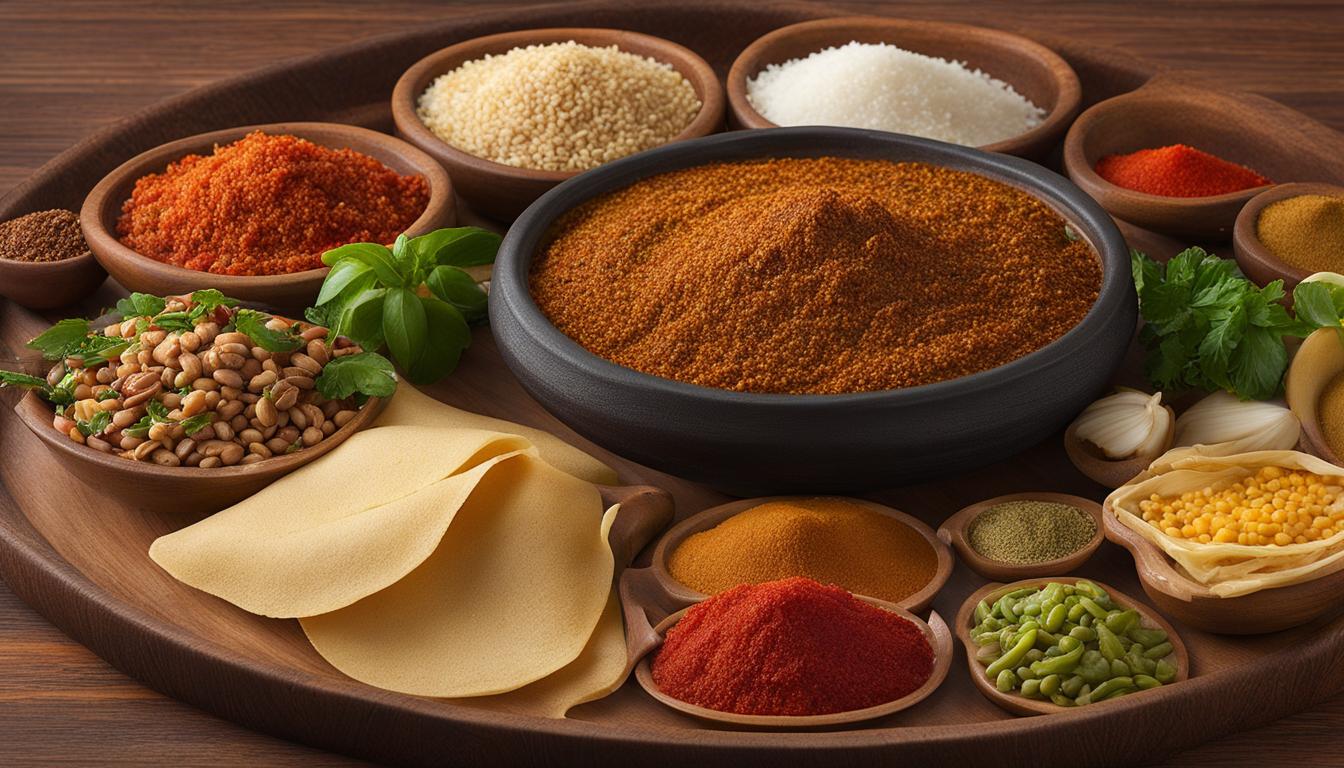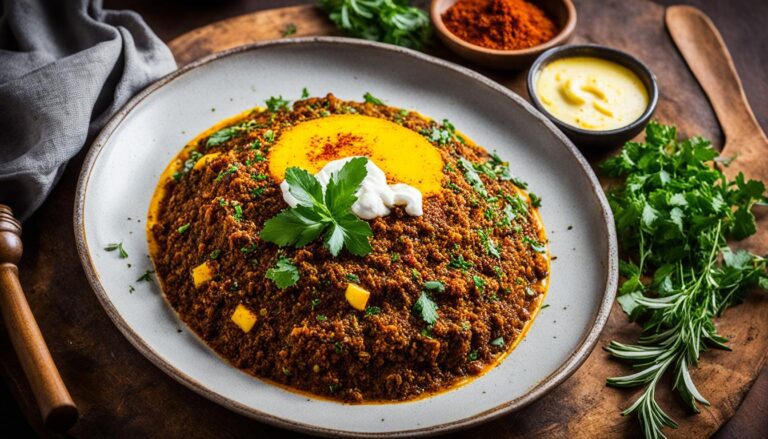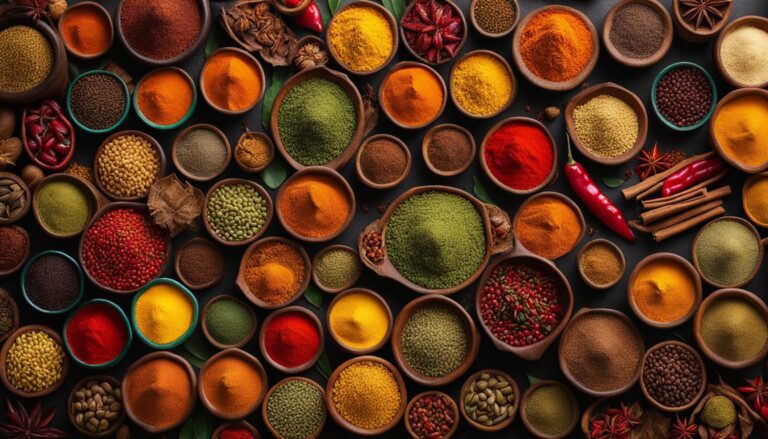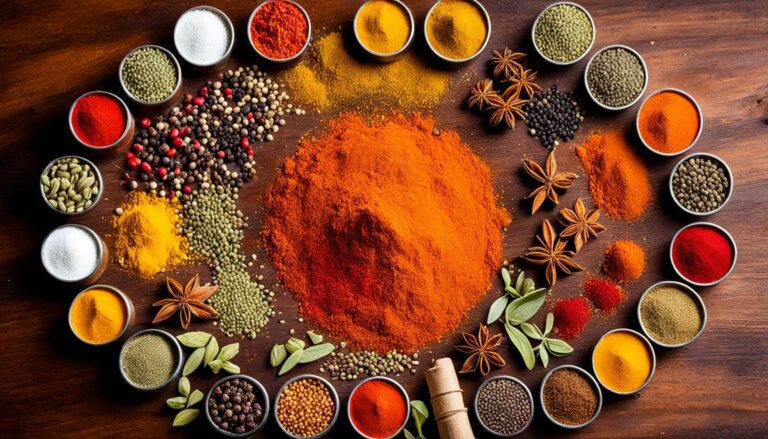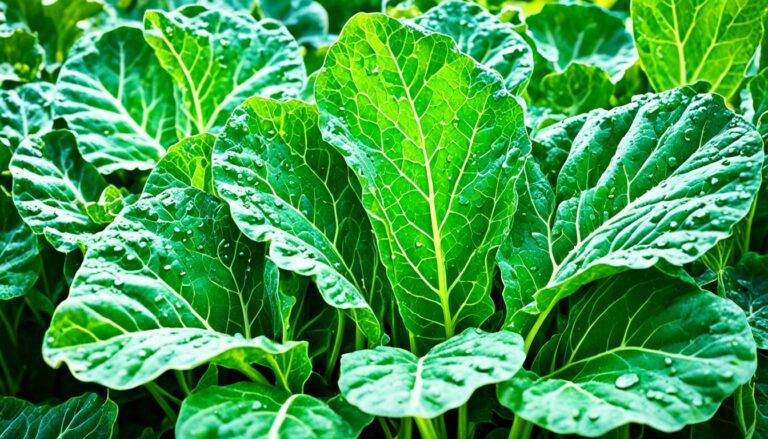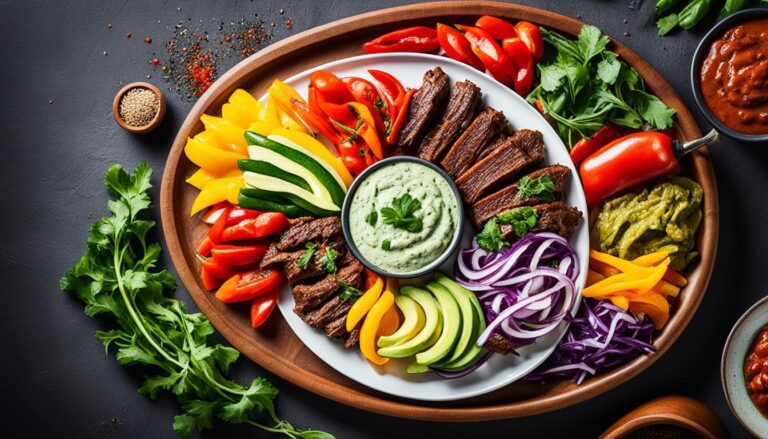Does Ethiopian Food Have Peanuts?
Welcome to our exploration of Ethiopian cuisine and the question on everyone’s mind: Does Ethiopian food contain peanuts? Join us as we embark on a flavorful journey through the rich cultural fare of Ethiopian dishes and uncover any allergen concerns for those enjoying this cuisine in the United States.
Key Takeaways:
- Ethiopian cuisine is known for its unique flavors and traditional dishes.
- Common ingredients in Ethiopian food include spices, lentils, and vibrant vegetables.
- For individuals with peanut allergies, it is essential to be aware of potential allergen concerns.
- There are peanut-free Ethiopian dishes available, as well as possible peanut substitutes.
- Ethiopian restaurants in the United States offer peanut-free options for those interested in trying this cultural fare.
Introduction to Ethiopian Cuisine
Before we dive into the peanuts aspect, let’s first provide an introduction to Ethiopian cuisine. Ethiopian cuisine is a flavorful and diverse culinary tradition that has captivated food enthusiasts around the world. Known for its unique flavors and traditional dishes, Ethiopian cuisine offers a delightful gastronomic experience.
When it comes to Ethiopian food, flavors are key. The cuisine is characterized by a beautiful blend of aromatic spices, which lend a distinct taste to each dish. From the fiery berbere spice blend to the fragrant combination of garlic, ginger, and turmeric, Ethiopian flavors are bold, complex, and unforgettable.
Traditional Ethiopian dishes showcase the country’s rich culinary heritage. One such dish is injera, a spongy flatbread made from fermented teff flour. Injera is often served with various stews, such as doro wat (chicken stew) or misir wat (spiced lentil stew). These dishes are typically enjoyed communally, with everyone tearing off a piece of injera and using it to scoop up the flavorful stews.
In addition to injera-based dishes, Ethiopian cuisine also features a wide array of vegetable and meat preparations. From tibs (grilled or sautéed meat) to kitfo (minced raw meat), there is something to suit every palate. Vegetarian options are abundant as well, with dishes like gomen (collard greens), shiro (spiced chickpea or lentil stew), and atakilt wat (cabbage and carrot stew).
As we explore Ethiopian cuisine further in this article, we will delve into the tantalizing flavors, traditional dishes, and carefully curated ingredients that make it a standout culinary experience. So join us on this journey through the vibrant world of Ethiopian cuisine.
Common Ingredients in Ethiopian Food
In Ethiopian cuisine, the flavors and aromas are as vibrant as the culture itself. This section will take you on a journey through the common ingredients that make Ethiopian food a culinary delight.
Spices: Ethiopian food is renowned for its aromatic and flavorful spices. From the fiery kick of berbere, a spice blend made with chili peppers, garlic, ginger, and more, to the complex flavors of mitmita, a spice mix featuring chili peppers, cardamom, and cloves, these spices add depth and character to Ethiopian dishes.
Lentils: Lentils are a staple in Ethiopian cuisine and play a significant role in many traditional dishes. Whether it’s the delicious red lentil stew known as misir wat or the hearty, slow-cooked yellow lentils in kik alicha, lentils bring protein and earthy flavors to Ethiopian meals.
Vegetables: Ethiopian food features an array of vegetables that contribute to its colorful and nutritious nature. From leafy greens like collard greens or spinach to root vegetables like potatoes and carrots, these fresh ingredients add texture and balance to Ethiopian dishes.
Injera: Injera is a unique and essential component of Ethiopian cuisine. It is a sourdough flatbread made from teff, a gluten-free grain native to Ethiopia. Injera is used as a base, eaten with various stews and dishes, and also serves as a utensil, allowing you to scoop up your favorite Ethiopian flavors.
Image:
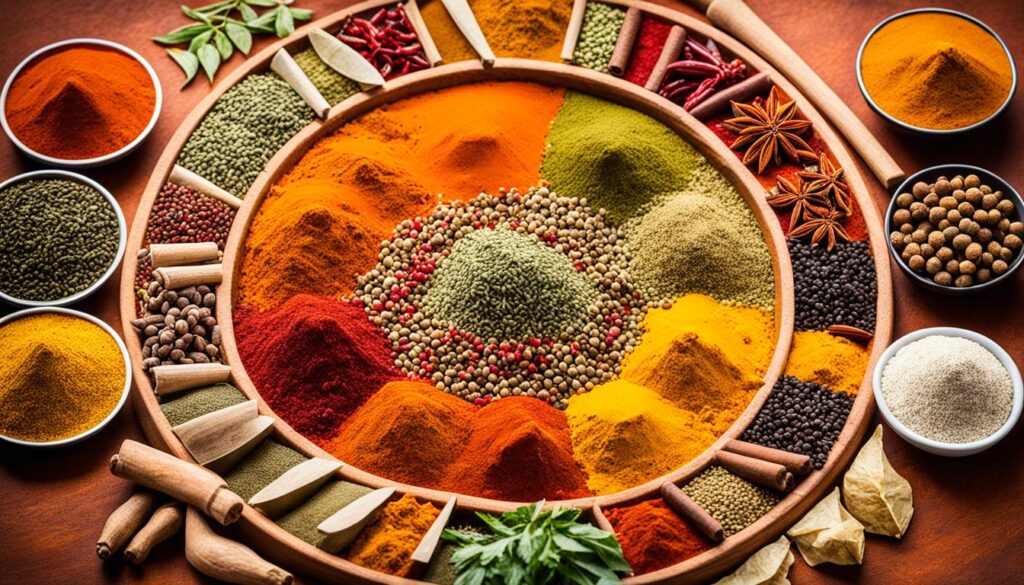
Allergen Concerns in Ethiopian Food
For individuals with food allergies or dietary restrictions, it’s important to address any potential allergens present in Ethiopian cuisine.
Ethiopian food is known for its rich flavors and diverse ingredients, but it’s crucial to be aware of allergens such as peanuts and the possibilities of cross-contamination.
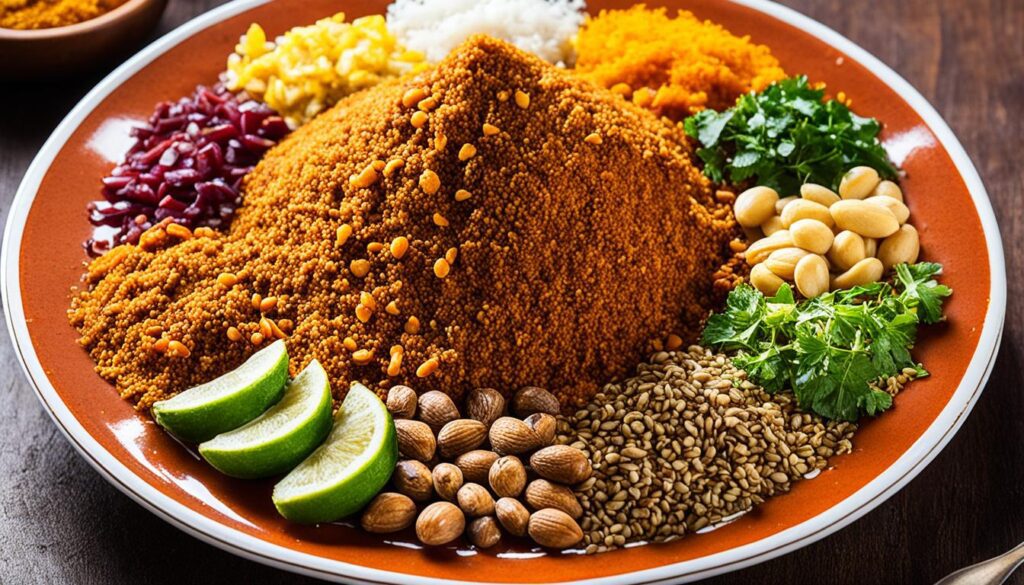
Peanuts are a common ingredient in many Ethiopian dishes, adding a unique taste and texture. However, they can pose a significant risk to individuals with peanut allergies. Cross-contamination is also a concern, as peanuts may be present in dishes prepared or served in the same kitchen.
It’s important to communicate any allergen concerns to restaurant staff when dining out, as they can provide guidance on safe menu options and take necessary precautions to minimize the risk of cross-contamination.
If you have a peanut allergy, it’s recommended to inform your server or the restaurant in advance, as they may be able to accommodate your dietary needs by offering peanut-free alternatives or modifying dishes to exclude peanuts.
By being proactive and informed about allergen concerns, you can still enjoy the flavors and cultural experience of Ethiopian cuisine while staying safe and avoiding any potential allergic reactions.
Peanut-Free Ethiopian Dishes
If you’re looking to enjoy Ethiopian food without peanuts, fear not! There are plenty of peanut-free Ethiopian dishes to savor. Ethiopia has a rich culinary tradition with a wide range of flavorful and aromatic dishes that don’t include peanuts.
Ethiopian cuisine is known for its use of diverse spices, vegetables, legumes, and grains, creating a vibrant and varied menu. Traditional recipes offer a plethora of options for those with peanut allergies or dietary preferences.
One popular peanut-free Ethiopian dish is injera, a spongy pancake-like bread made from fermented teff flour. It serves as a foundation for many Ethiopian meals and can be paired with various stews and vegetable dishes without involving peanuts.
Another delicious option is Doro Wat, a spicy chicken stew made with berbere, a flavorful spice blend. This savory dish is typically served with injera and enjoyed across Ethiopia, making it a staple in Ethiopian cuisine.
For those seeking peanut substitutes in their Ethiopian dishes, there are several alternatives that can add richness and depth to the flavors. Ground almonds or cashews can be utilized to provide a similar texture and nutty flavor in certain recipes. However, it’s crucial to ensure that the substitute is safe and suitable for individual dietary requirements.
Whether you’re exploring Ethiopian cuisine for the first time or indulging in familiar favorites, the array of peanut-free options will satisfy your taste buds and allow you to enjoy the vibrant flavors of Ethiopia’s traditional dishes.
Ethiopian Restaurants in the United States
If you’re in the United States and interested in trying Ethiopian cuisine while avoiding peanuts, we’ve got you covered. In this section, we will provide information on Ethiopian restaurants that offer peanut-free options across different cities.
Many Ethiopian restaurants in the United States understand the importance of catering to various dietary needs and offer peanut-free dishes on their menus. Whether you have a peanut allergy or simply prefer to enjoy your meal without peanuts, these restaurants have you in mind.
One popular Ethiopian restaurant that caters to peanut allergies is Awash Ethiopian Restaurant in New York City. With its extensive menu and knowledgeable staff, Awash ensures a safe and flavorful dining experience for those with peanut allergens. Their peanut-free options include traditional dishes like injera with flavorful sauces and hearty stews.
If you find yourself in Washington, D.C., be sure to visit Keren, a renowned Ethiopian restaurant known for its peanut-free options. They prioritize the inclusion of everyone, offering a variety of delicious dishes without peanuts. From vegetarian options like lentil sambusas to robust meat platters, Keren ensures a memorable dining experience free from allergen concerns.
In the beautiful city of San Francisco, Moya Ethiopian Cuisine is a go-to restaurant for those seeking peanut-free Ethiopian dishes. Moya’s menu boasts an array of flavorful options, including peanut-free variations of staple dishes such as doro wat and kitfo. Their commitment to providing peanut-free options ensures that all guests can indulge in traditional Ethiopian fare without worry.
These are just a few examples of Ethiopian restaurants across different cities in the United States that offer peanut-free options. When dining out, it’s always a good idea to communicate your dietary preferences and allergies to the staff, ensuring that your meal is prepared with utmost care and consideration.
Next, we will conclude our exploration of Ethiopian cuisine and summarize our findings regarding peanuts, allergen concerns, and the cultural significance of this delightful fare.
Conclusion
In conclusion, Ethiopian food offers a rich and diverse culinary experience that showcases unique flavors and cultural fare. However, for individuals with peanut allergies, there are allergen concerns to be aware of, as Ethiopian cuisine can indeed contain peanuts. It is crucial for those with peanut allergies to exercise caution when enjoying Ethiopian dishes, ensuring they are well-informed about the ingredients used.
That being said, Ethiopian cuisine also provides numerous peanut-free options for individuals who wish to savor the flavors without worrying about allergens. Traditional recipes can be modified or adapted to exclude peanuts, allowing everyone to partake in the deliciousness of Ethiopian food.
Whether it’s injera, doro wat, or kitfo, Ethiopian restaurants in the United States are known for their diverse offerings and exceptional peanut-free dishes. With increasing awareness of allergen concerns, many Ethiopian eateries are accommodating the needs of customers by providing peanut-free options on their menus.
So, whether you’re a peanut lover or have peanut allergies, exploring Ethiopian cuisine can be a delightful adventure. From the vibrant spices to the aromatic flavors, Ethiopian food continues to captivate food enthusiasts in the United States, offering a cultural fare that truly satisfies the palate.

